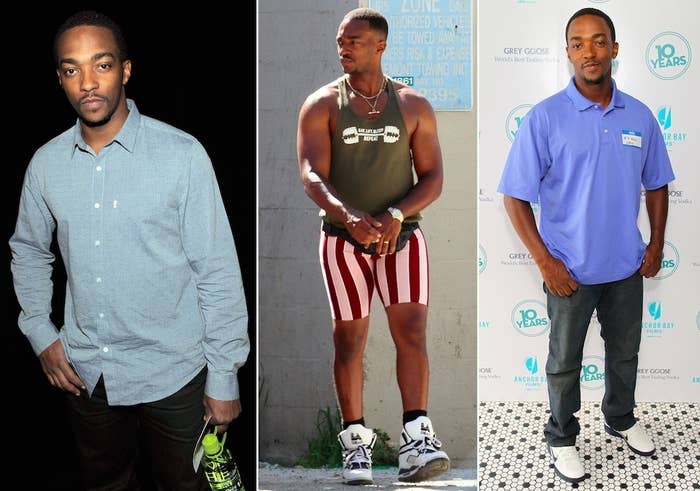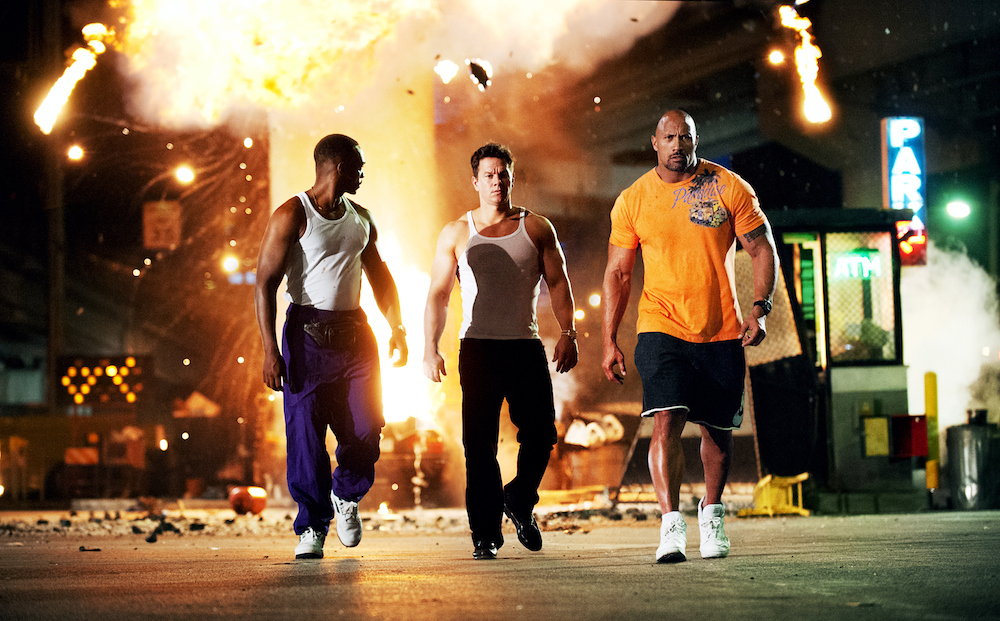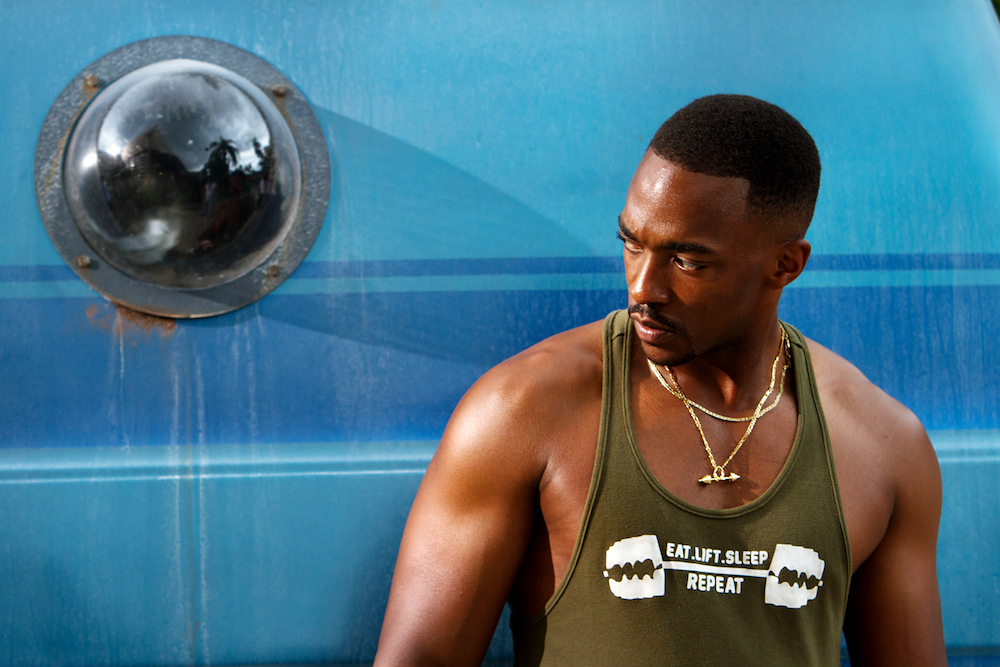From left to right: Anthony Mackie in Jan. 2012; Mackie on the set of Pain & Gain in April 2012; and Mackie in Sept. 2012

When he was cast in Pain & Gain, which opens this weekend, Anthony Mackie (The Hurt Locker, Gangster Squad) had just five weeks to transform his body from his everyday actor physique to that of a muscle-bound gym addict who abuses steroids so much it shrinks his manhood. His co-stars Mark Wahlberg and Dwayne "The Rock" Johnson, by contrast, had several months to get their bodies in fighting shape for director Michael Bay's dark true-crime satire. Mackie says he grew from 190 pounds to a hulking 213 for the Pain & Gain shoot last spring, but how do you do that without actually taking steroids? And what affect does that have on your personality?
When you were first cast in Pain & Gain, did you have an appreciation for how you would have to look for the movie?
Anthony Mackie: I did. I was looking forward to it. My last few movies, I had played a cop or some sort of government official, so I had gotten lazy and fat. So I was looking for a project to help me get back in the gym and start working out. When I read the script, I was 100 percent into it. It couldn't have fell into my lap at a better time.
So how much time did you have between when you knew you were going to be doing it and when you had to start shooting?
AM: I had five weeks.
Five weeks?!
AM: Yeah. Which was nerve-wracking because Dwayne and Mark, they had months to prepare. To catch up, I went on this odd diet and did two-a-days, so I would go to the gym in the morning and in the evening.
What particular diet did they place you on?
AM: It was more something I did for myself. Just a lot of lean protein, light carbs — for my carbs, I would eat a baked sweet potato every day. I would do six meals a day. A meal every three hours. You have to sleep eight hours a day. You have to.
You have to give the muscles time to recover.
AM: Yeah. When you sleep, you grow. That's the rule.
You put yourself on the diet — were you working with a trainer?
AM: No, I have a guy in New Orleans who's a friend of mine that I work out with. We would just push each other every day. Then once the movie started, Mark and I would work out every morning together.
What did the workouts consist of?
AM: Heavy weights. A lot of lifting. A lot of pushing and pulling, that's what we called it. It was interesting — we would break our body up into three groups. Every day, we would rotate the groups. You would do chest and triceps, back and biceps, shoulders and legs. So on Monday, we would do chest and triceps, Tuesday, back and biceps, Wednesday, legs and shoulders. Then on Thursday, chest and triceps. Friday, back and biceps. Saturday, legs and shoulders.
And then Sunday you'd rest?
AM: Yes. Heavy rest. With no alcohol, no nothing.

The workouts that you did with Mark, were those any different?
AM: Not at all. I think that's why we worked out together, because we were on the same page as far as our body and what we wanted to do with it for the movie. Mark was working out really hard because he was coming out with his health line through GNC called MARKED, so he was really going hard in the gym. We just, we both pushed each other to our limits every day. He's a great partner in the gym.
Your character in Pain & Gain uses steroids in the extreme. Did you have to talk to anybody about how to produce that look?
AM: What was funny, going to the gym, you see all these guys who are just massive. There's no way a person can naturally get that way. In the gym, you meet these guys and you talk to them, and everybody's really willing and open to explain to you what cycle they're on and to help you get on it.
Was it ever tempting to try?
AM: No. No no no. I — no, no. Every time I thought about it, it was so horrifying to me, the idea of not being able to — not being able to rise to the occasion for a look wasn't something I was interested in.
As you went through all of this with the change in the diet and all of the working out, other than the sheer feeling of exhaustion, did you notice any changes in how you felt as you went through this process?
AM: Yeah, definitely. When you put that much weight on, your body reacts differently, and it's really draining. There's nothing natural or fun about [it]. It's just a lifestyle change. There are certain things I can do at 185 where I am now that I couldn't do at 213 when we were shooting. I just felt heavy and lethargic. That's why I worked so hard to get all the weight off and get back down to my natural size.
How hard was that to do? How long did it take you to go back to where you were at the start of all this?
AM: It didn't take long at all. I would say about five weeks. A lot of cardio, I changed my diet, did more free weights. More light free weights as opposed to all that heavy lifting. I know my body pretty well, so it reacts extremely quickly when I change by diet and my workout. It was fun — I enjoyed the opportunity to get that big. I hadn't been big like that since high school, and when you're young, nothing fazes you, but as we get older, oof. It's harder.
It's a nice excuse to see what that felt like and then be able to go back to your normal life.
AM: Exactly. I'm definitely not a muscle builder or a guy that's interested in being a muscle builder. It feels good to get back down to a normal size. Not like a hipster size or a buff-guy size, but just a normal, 34-waist guy.
As an actor, you haven't had the same muscle-bound persona that Mark Wahlberg and The Rock have, so I'm wondering how much you naturally work out?
AM: I do a lot. I work out every day just to keep in shape. I feel like I never want to get stuck in a position where when you need somebody with great arms, you call Anthony Mackie. That hasn't been the calling card for my career, and nor do I want it to be. As actors, the great thing about our career is we get to change from role to role. I don't want to be known as "put him in the movie because he has nice abs" guy.

I wanted to circle back to your diet — was there any particular meal among the meals that you were having six times a day that you either really looked forward to or really dreaded?
AM: (Laughs) Well the basic meal I would have, my go-to meal, I had a little George Foreman grill that I would carry around with me, and I had these turkey burgers from Costco. I would pop them on my grill with some asparagus and a little Pace picante sauce. That was my go-to, in-case-of-emergency meal. Mostly, [the meal] I would look forward to — I would get my girlfriend to make me lamb. I love lamb, and she would make me lamb on Sunday. That was my celebration meal for having a good week of not breaking my diet.
Was there any particular food where you were like, "Oh, god, I have to have this again now"?
AM: Yeah, I would definitely say the chicken breast. It just drove me fucking insane. After you have chicken breast once a day for three days, it's like you never want to eat another chicken again.
Especially because they're boiled, right?
AM: They have no flavor. They just taste like rubber.
Was there any protein powder or any of those kinds of things?
AM: I did protein powder every day after my workout. I would do a half banana, a scoop of peanut butter, and a scoop of protein with skim milk and make a smoothie, and that would give me a huge hit of protein. I would do that for my first meal, and then I would do it again after my workout, so the other five meals were when I would get the diet going every three hours. But yeah, I did a lot of protein powder.
I don't want to get too personal with this question, and if I am getting too personal, please tell me. But how was all of this intake on your system?
AM: (Long pause, then laughter) Actually, you know what, that's a very good question. It was hard. I spent a lot of time in the bathroom. That's what you have to realize — you eat so much, literally, every time you have a meal, when you finish your meal, you go to the bathroom because you're constantly putting in as it's coming out, and it's a cycle. Your body's just squeezing all the nutrients out of everything you eat and pushing it right out. I was very regular.
Well, there's worse things.
AM: Exactly. Exactly.
This interview has been edited and condensed.
